新标准大学英语综合教程3课文翻译(完整版)
- 格式:wps
- 大小:121.00 KB
- 文档页数:29
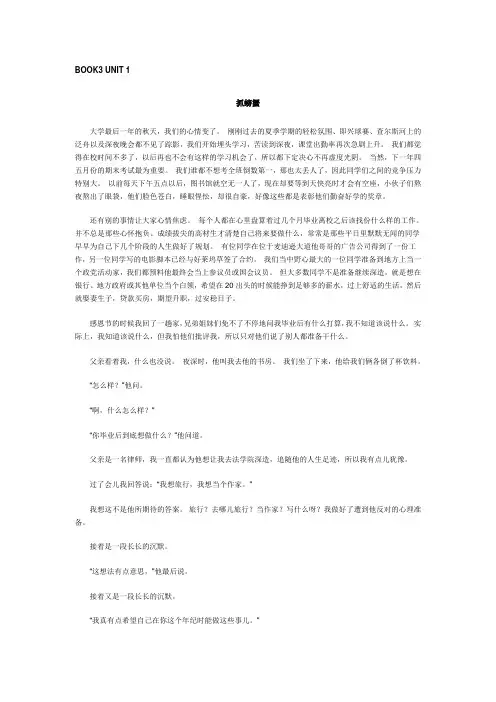
BOOK3 UNIT 1抓螃蟹大学最后一年的秋天,我们的心情变了。
刚刚过去的夏季学期的轻松氛围、即兴球赛、查尔斯河上的泛舟以及深夜晚会都不见了踪影,我们开始埋头学习,苦读到深夜,课堂出勤率再次急剧上升。
我们都觉得在校时间不多了,以后再也不会有这样的学习机会了,所以都下定决心不再虚度光阴。
当然,下一年四五月份的期末考试最为重要。
我们谁都不想考全班倒数第一,那也太丢人了,因此同学们之间的竞争压力特别大。
以前每天下午五点以后,图书馆就空无一人了,现在却要等到天快亮时才会有空座,小伙子们熬夜熬出了眼袋,他们脸色苍白,睡眼惺忪,却很自豪,好像这些都是表彰他们勤奋好学的奖章。
还有别的事情让大家心情焦虑。
每个人都在心里盘算着过几个月毕业离校之后该找份什么样的工作。
并不总是那些心怀抱负、成绩拔尖的高材生才清楚自己将来要做什么,常常是那些平日里默默无闻的同学早早为自己下几个阶段的人生做好了规划。
有位同学在位于麦迪逊大道他哥哥的广告公司得到了一份工作,另一位同学写的电影脚本已经与好莱坞草签了合约。
我们当中野心最大的一位同学准备到地方上当一个政党活动家,我们都预料他最终会当上参议员或国会议员。
但大多数同学不是准备继续深造,就是想在银行、地方政府或其他单位当个白领,希望在20出头的时候能挣到足够多的薪水,过上舒适的生活,然后就娶妻生子,贷款买房,期望升职,过安稳日子。
感恩节的时候我回了一趟家,兄弟姐妹们免不了不停地问我毕业后有什么打算,我不知道该说什么。
实际上,我知道该说什么,但我怕他们批评我,所以只对他们说了别人都准备干什么。
父亲看着我,什么也没说。
夜深时,他叫我去他的书房。
我们坐了下来,他给我们俩各倒了杯饮料。
“怎么样?”他问。
“啊,什么怎么样?”“你毕业后到底想做什么?”他问道。
父亲是一名律师,我一直都认为他想让我去法学院深造,追随他的人生足迹,所以我有点儿犹豫。
过了会儿我回答说:“我想旅行,我想当个作家。
”我想这不是他所期待的答案。
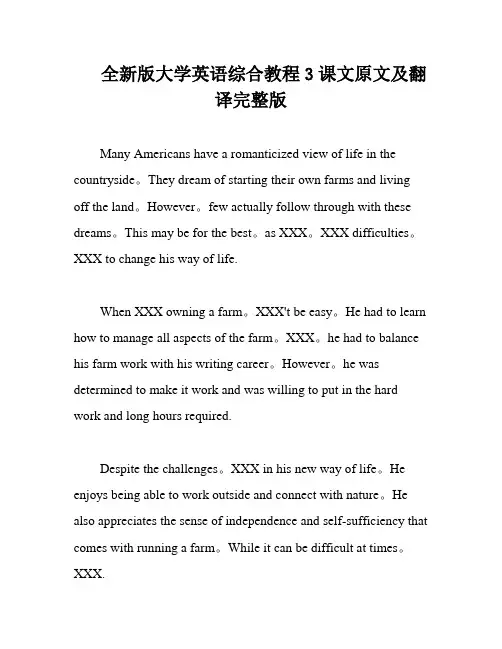
全新版大学英语综合教程3课文原文及翻译完整版Many Americans have a romanticized view of life in the countryside。
They dream of starting their own farms and living off the land。
However。
few actually follow through with these dreams。
This may be for the best。
as XXX。
XXX difficulties。
XXX to change his way of life.When XXX owning a farm。
XXX't be easy。
He had to learn how to manage all aspects of the farm。
XXX。
he had to balance his farm work with his writing career。
However。
he was determined to make it work and was willing to put in the hard work and long hours required.Despite the challenges。
XXX in his new way of life。
He enjoys being able to work outside and connect with nature。
He also appreciates the sense of independence and self-sufficiency that comes with running a farm。
While it can be difficult at times。
XXX.In n。
while farming may not be the XXX。
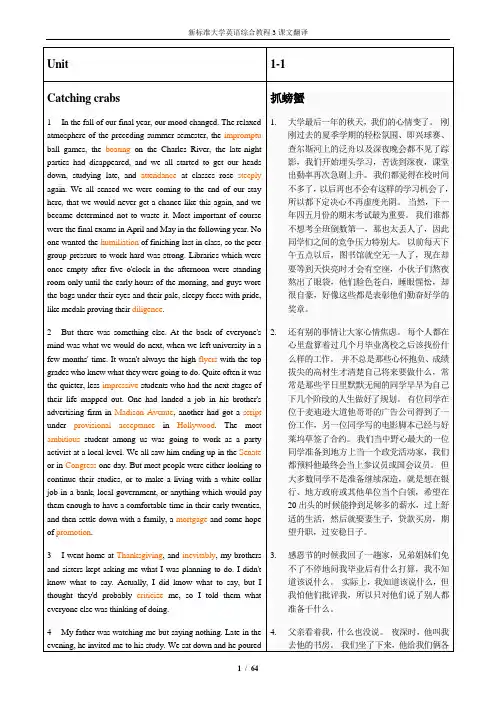
Unit 1-1Catching crabs1 In the fall of our final year, our mood changed. The relaxed atmosphere of the preceding summer semester, the impromptu ball games, the boating on the Charles River, the late-night parties had disappeared, and we all started to get our heads down, studying late, and attendance at classes rose steeply again. We all sensed we were coming to the end of our stay here, that we would never get a chance like this again, and we became determined not to waste it. Most important of course were the final exams in April and May in the following year. No one wanted the humiliation of finishing last in class, so the peer group pressure to work hard was strong. Libraries which were once empty after five o'clock in the afternoon were standing room only until the early hours of the morning, and guys wore the bags under their eyes and their pale, sleepy faces with pride, like medals proving their diligence.2 But there was something else. At the back of everyone's mind was what we would do next, when we left university in a few months' time. It wasn't always the high flyers with the top grades who knew what they were going to do. Quite often it was the quieter, less impressive students who had the next stages of their life mapped out. One had landed a job in his brother's advertising firm in Madison Avenue, another had got a script under provisional acceptance in Hollywood. The most ambitious student among us was going to work as a party activist at a local level. We all saw him ending up in the Senate or in Congress one day. But most people were either looking to continue their studies, or to make a living with a white-collar job in a bank, local government, or anything which would pay them enough to have a comfortable time in their early twenties, and then settle down with a family, a mortgage and some hope of promotion.3 I went home at Thanksgiving, and inevitably, my brothers and sisters kept asking me what I was planning to do. I didn't know what to say. Actually, I did know what to say, but I thought they'd probably criticize me, so I told them what everyone else was thinking of doing.4 My father was watching me but saying nothing. Late in the evening, he invited me to his study. We sat down and he poured 抓螃蟹1.大学最后一年的秋天,我们的心情变了。

Unit 1-1Catching crabs1 In the fall of our final year, our mood changed. The relaxed atmosphere of the preceding summer semester, the impromptu ball games, the boating on the Charles River, the late-night parties had disappeared, and we all started to get our heads down, studying late, and attendance at classes rose steeply again. We all sensed we were coming to the end of our stay here, that we would never get a chance like this again, and we became determined not to waste it. Most important of course were the final exams in April and May in the following year. No one wanted the humiliation of finishing last in class, so the peer group pressure to work hard was strong. Libraries which were once empty after five o'clock in the afternoon were standing room only until the early hours of the morning, and guys wore the bags under their eyes and their pale, sleepy faces with pride, like medals proving their diligence.2 But there was something else. At the back of everyone's mind was what we would do next, when we left university in a few months' time. It wasn't always the high flyers with the top grades who knew what they were going to do. Quite often it was the quieter, less impressive students who had the next stages of their life mapped out. One had landed a job in his brother's advertising firm in Madison Avenue, another had got a script under provisional acceptance in Hollywood. The most ambitious student among us was going to work as a party activist at a local level. We all saw him ending up in the Senate or in Congress one day. But most people were either looking to continue their studies, or to make a living with a white-collar job in a bank, local government, or anything which would pay them enough to have a comfortable time in their early twenties, and then settle down with a family, a mortgage and some hope of promotion.3 I went home at Thanksgiving, and inevitably, my brothers and sisters kept asking me what I was planning to do. I didn't know what to say. Actually, I did know what to say, but I thought they'd probably criticize me, so I told them what everyone else was thinking of doing.4 My father was watching me but saying nothing. Late in the evening, he invited me to his study. We sat down and he poured 抓螃蟹1.大学最后一年的秋天,我们的心情变了。
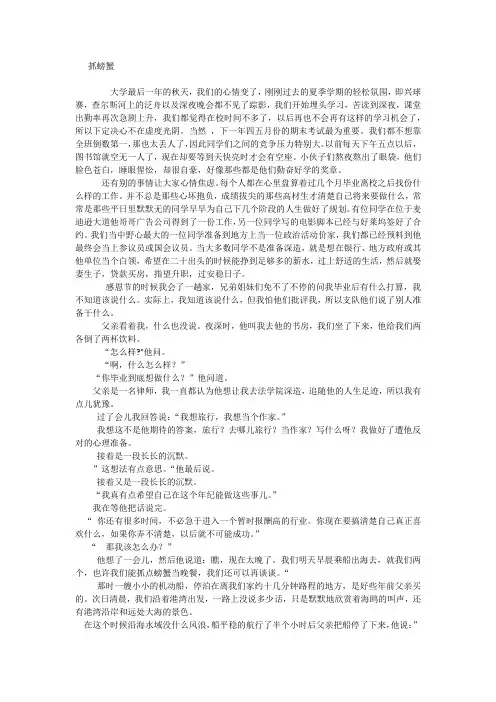
抓螃蟹大学最后一年的秋天,我们的心情变了,刚刚过去的夏季学期的轻松氛围,即兴球赛,查尔斯河上的泛舟以及深夜晚会都不见了踪影,我们开始埋头学习,苦读到深夜,课堂出勤率再次急剧上升,我们都觉得在校时间不多了,以后再也不会再有这样的学习机会了,所以下定决心不在虚度光阴。
当然,下一年四五月份的期末考试最为重要。
我们都不想靠全班倒数第一,那也太丢人了,因此同学们之间的竞争压力特别大。
以前每天下午五点以后,图书馆就空无一人了,现在却要等到天快亮时才会有空座。
小伙子们熬夜熬出了眼袋,他们脸色苍白,睡眼惺忪,却很自豪,好像那些都是他们勤奋好学的奖章。
还有别的事情让大家心情焦虑。
每个人都在心里盘算着过几个月毕业离校之后找份什么样的工作。
并不总是那些心坏抱负,成绩拔尖的那些高材生才清楚自己将来要做什么,常常是那些平日里默默无的同学早早为自己下几个阶段的人生做好了规划。
有位同学在位于麦迪逊大道他哥哥广告公司得到了一份工作,另一位同学写的电影脚本已经与好莱坞签好了合约。
我们当中野心最大的一位同学准备到地方上当一位政治活动价家,我们都已经预料到他最终会当上参议员或国会议员。
当大多数同学不是准备深造,就是想在银行、地方政府或其他单位当个白领,希望在二十出头的时候能挣到足够多的薪水,过上舒适的生活,然后就娶妻生子,贷款买房,指望升职,过安稳日子。
感恩节的时候我会了一趟家,兄弟姐妹们免不了不停的问我毕业后有什么打算,我不知道该说什么。
实际上,我知道该说什么,但我怕他们批评我,所以支队他们说了别人准备干什么。
父亲看着我,什么也没说。
夜深时,他叫我去他的书房,我们坐了下来,他给我们两各倒了两杯饮料。
“怎么样?"他问。
“啊,什么怎么样?”“你毕业到底想做什么?”他问道。
父亲是一名律师,我一直都认为他想让我去法学院深造,追随他的人生足迹,所以我有点儿犹豫。
过了会儿我回答说:“我想旅行,我想当个作家。
”我想这不是他期待的答案,旅行?去哪儿旅行?当作家?写什么呀?我做好了遭他反对的心理准备。
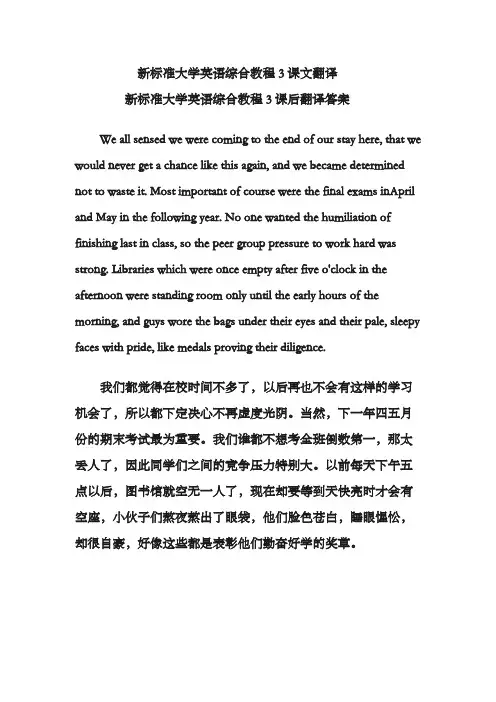
新标准大学英语综合教程3课文翻译新标准大学英语综合教程3课后翻译答案We all sensed we were coming to the end of our stay here, that we would never get a chance like this again, and we became determined not to waste it. Most important of course were the final exams inApril and May in the following year. No one wanted the humiliation of finishing last in class, so the peer group pressure to work hard was strong. Libraries which were once empty after five o'clock in the afternoon were standing room only until the early hours of the morning, and guys wore the bags under their eyes and their pale, sleepy faces with pride, like medals proving their diligence.我们都觉得在校时间不多了,以后再也不会有这样的学习机会了,所以都下定决心不再虚度光阴。
当然,下一年四五月份的期末考试最为重要。
我们谁都不想考全班倒数第一,那太丢人了,因此同学们之间的竞争压力特别大。
以前每天下午五点以后,图书馆就空无一人了,现在却要等到天快亮时才会有空座,小伙子们熬夜熬出了眼袋,他们脸色苍白,睡眼惺忪,却很自豪,好像这些都是表彰他们勤奋好学的奖章。
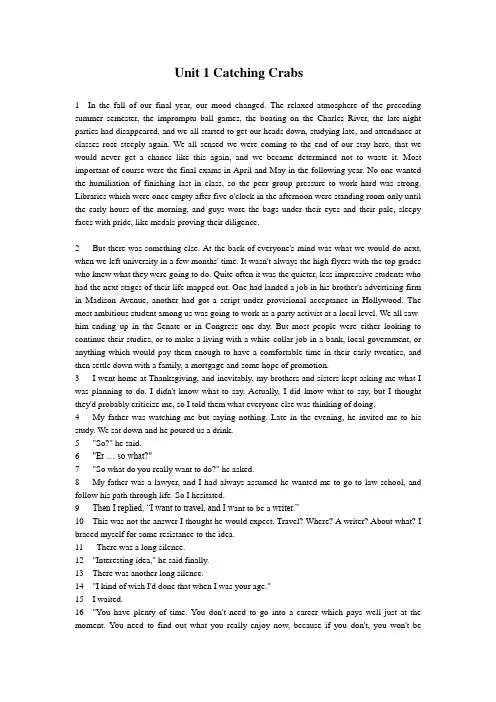
Unit 1 Catching Crabs1 In the fall of our final year, our mood changed. The relaxed atmosphere of the preceding summer semester, the impromptu ball games, the boating on the Charles River, the late-night parties had disappeared, and we all started to get our heads down, studying late, and attendance at classes rose steeply again. We all sensed we were coming to the end of our stay here, that we would never get a chance like this again, and we became determined not to waste it. Most important of course were the final exams in April and May in the following year. No one wanted the humiliation of finishing last in class, so the peer group pressure to work hard was strong. Libraries which were once empty after five o'clock in the afternoon were standing room only until the early hours of the morning, and guys wore the bags under their eyes and their pale, sleepy faces with pride, like medals proving their diligence.2 But there was something else. At the back of everyone's mind was what we would do next, when we left university in a few months' time. It wasn't always the high flyers with the top grades who knew what they were going to do. Quite often it was the quieter, less impressive students who had the next stages of their life mapped out. One had landed a job in his brother's advertising firm in Madison Avenue, another had got a script under provisional acceptance in Hollywood. The most ambitious student among us was going to work as a party activist at a local level. We all saw him ending up in the Senate or in Congress one day. But most people were either looking to continue their studies, or to make a living with a white-collar job in a bank, local government, or anything which would pay them enough to have a comfortable time in their early twenties, and then settle down with a family, a mortgage and some hope of promotion.3 I went home at Thanksgiving, and inevitably, my brothers and sisters kept asking me what I was planning to do. I didn't know what to say. Actually, I did know what to say, but I thought they'd probably criticize me, so I told them what everyone else was thinking of doing.4 My father was watching me but saying nothing. Late in the evening, he invited me to his study. We sat down and he poured us a drink.5 "So?" he said.6 "Er … so what?"7 "So what do you really want to do?" he asked.8 My father was a lawyer, and I had always assumed he wanted me to go to law school, and follow his path through life. So I hesitated.9 Then I replied, “I want to travel, and I w ant to be a writer.”10 This was not the answer I thought he would expect. Travel? Where? A writer? About what? I braced myself for some resistance to the idea.11 There was a long silence.12 "Interesting idea," he said finally.13 There was another long silence.14 "I kind of wish I'd done that when I was your age."15 I waited.16 "You have plenty of time. You don't need to go into a career which pays well just at the moment. You need to find out what you really enjoy now, because if you don't, you won't besuccessful later."17 "So how do I do this?“18 He thought for a moment. Then he said, "Look, it's late. Let's take the boat out tomorrow morning, just you and me. Maybe we can catch some crabs for dinner, and we can talk more."19 It was a small motor boat, moored ten minutes away, and my father had owned it for years. Early next morning we set off along the estuary. We didn't talk much, but enjoyed the sound of the seagulls and the sight of the estuary coastline and the sea beyond.20 There was no surf on the coastal waters at that time of day, so it was a smooth half-hour ride until my father switched off the motor. "Let's see if we get lucky," he said, picked up a rusty, mesh basket with a rope attached and threw it into the sea.21 We waited a while, then my father stood up and said, "Give me a hand with this," and we hauled up the crab cage onto the deck.22 Crabs fascinated me. They were so easy to catch. It wasn't just that they crawled into such an obvious trap, through a small hole in the lid of the basket, but it seemed as if they couldn't be bothered to crawl out again even when you took the lid off. They just sat there, waving their claws at you.23 The cage was brimming with dozens of soft shell crabs, piled high on top of each other. "Why don't they try to escape?" I wondered aloud to my father.24 "Just watch them for a moment. Look at that one, there! He's trying to climb out, but every time the other crabs pull him back in," said my father.25 And we watched. The crab climbed up the mesh towards the lid, and sure enough, just as it reached the top, one of its fellow crabs reached out, clamped its claw onto any available leg, and pulled it back. Several times the crab tried to defy his fellow captives, without luck.26 "Now watch!" said my father. "He's starting to get bored with this game."27 Not only did the crab give up its lengthy struggle to escape, but it actually began to help stop other crabs trying to escape. He'd finally chosen an easy way of life.28 Suddenly I understood why my father had suggested catching crabs that morning. He looked at me. "Don't get pulled back by the others," he said. "Spend some time figuring out who you are and what you want in life. Look back at the classes you're taking, and think about which ones were most productive for you personally. Then think about what's really important to you, what really interests you, what skills you have. Try to figure out where you want to live, where you want to go, what you want to earn, how you want to work. And if you can't answer these questions now, then take some time to find out. Because if you don't, you'll never be happy."29 He paused.30 "So you want to travel?" he asked.31 "Yes," I replied.32 "Better get you a passport. And you want to be a writer?"33 "I think so."34 "Interesting choice. We've never had a writer in the family," he said.35 My father started the motor and we set off back home.抓螃蟹1 大学最后一年的秋天,我们的心情变了。
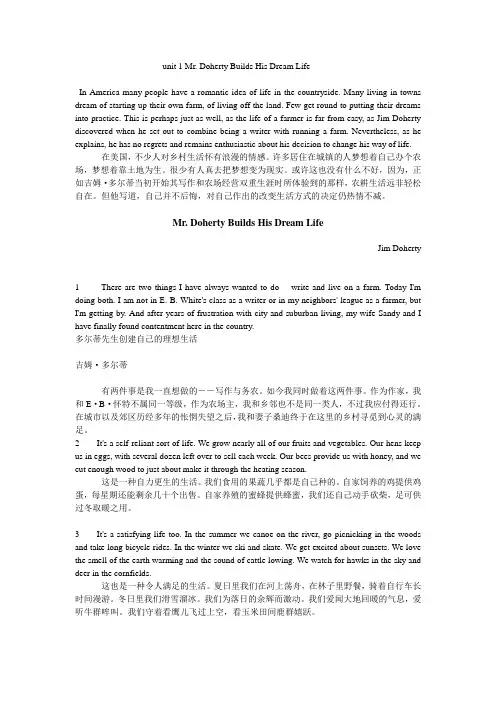
unit 1 Mr. Doherty Builds His Dream LifeIn America many people have a romantic idea of life in the countryside. Many living in towns dream of starting up their own farm, of living off the land. Few get round to putting their dreams into practice. This is perhaps just as well, as the life of a farmer is far from easy, as Jim Doherty discovered when he set out to combine being a writer with running a farm. Nevertheless, as he explains, he has no regrets and remains enthusiastic about his decision to change his way of life.在美国,不少人对乡村生活怀有浪漫的情感。
许多居住在城镇的人梦想着自己办个农场,梦想着靠土地为生。
很少有人真去把梦想变为现实。
或许这也没有什么不好,因为,正如吉姆·多尔蒂当初开始其写作和农场经营双重生涯时所体验到的那样,农耕生活远非轻松自在。
但他写道,自己并不后悔,对自己作出的改变生活方式的决定仍热情不减。
Mr. Doherty Builds His Dream LifeJim Doherty1 There are two things I have always wanted to do -- write and live on a farm. Today I'm doing both. I am not in E. B. White's class as a writer or in my neighbors' league as a farmer, but I'm getting by. And after years of frustration with city and suburban living, my wife Sandy and I have finally found contentment here in the country.多尔蒂先生创建自己的理想生活吉姆·多尔蒂有两件事是我一直想做的――写作与务农。
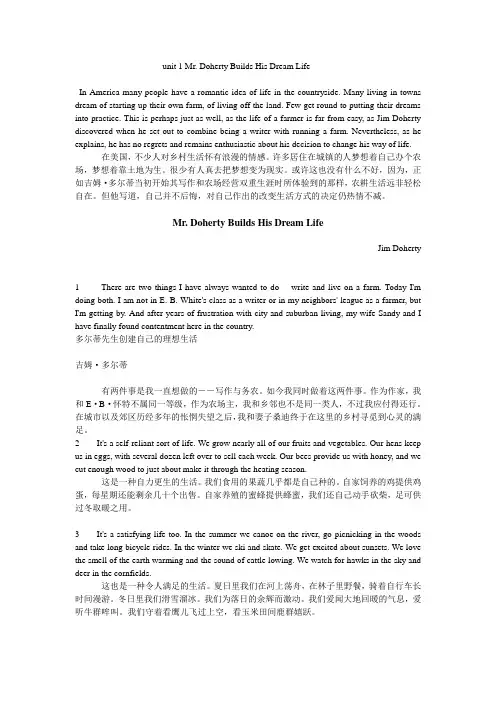
unit 1 Mr. Doherty Builds His Dream LifeIn America many people have a romantic idea of life in the countryside. Many living in towns dream of starting up their own farm, of living off the land. Few get round to putting their dreams into practice. This is perhaps just as well, as the life of a farmer is far from easy, as Jim Doherty discovered when he set out to combine being a writer with running a farm. Nevertheless, as he explains, he has no regrets and remains enthusiastic about his decision to change his way of life.在美国,不少人对乡村生活怀有浪漫的情感。
许多居住在城镇的人梦想着自己办个农场,梦想着靠土地为生。
很少有人真去把梦想变为现实。
或许这也没有什么不好,因为,正如吉姆·多尔蒂当初开始其写作和农场经营双重生涯时所体验到的那样,农耕生活远非轻松自在。
但他写道,自己并不后悔,对自己作出的改变生活方式的决定仍热情不减。
Mr. Doherty Builds His Dream LifeJim Doherty1 There are two things I have always wanted to do -- write and live on a farm. Today I'm doing both. I am not in E. B. White's class as a writer or in my neighbors' league as a farmer, but I'm getting by. And after years of frustration with city and suburban living, my wife Sandy and I have finally found contentment here in the country.多尔蒂先生创建自己的理想生活吉姆·多尔蒂有两件事是我一直想做的――写作与务农。
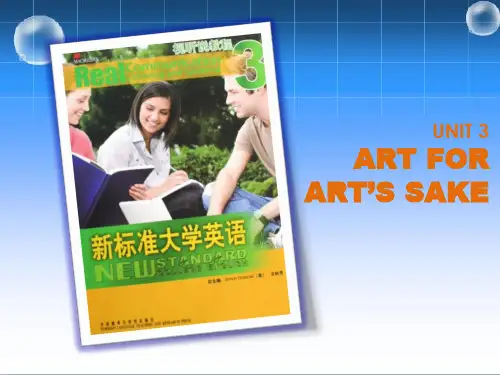
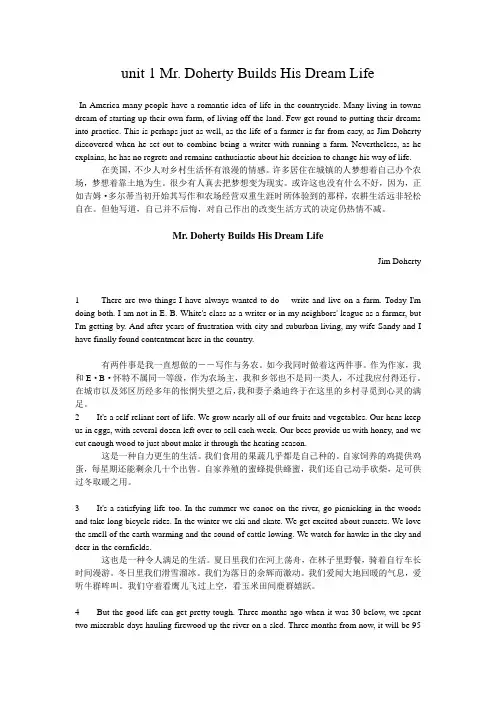
unit 1 Mr. Doherty Builds His Dream LifeIn America many people have a romantic idea of life in the countryside. Many living in towns dream of starting up their own farm, of living off the land. Few get round to putting their dreams into practice. This is perhaps just as well, as the life of a farmer is far from easy, as Jim Doherty discovered when he set out to combine being a writer with running a farm. Nevertheless, as he explains, he has no regrets and remains enthusiastic about his decision to change his way of life.在美国,不少人对乡村生活怀有浪漫的情感。
许多居住在城镇的人梦想着自己办个农场,梦想着靠土地为生。
很少有人真去把梦想变为现实。
或许这也没有什么不好,因为,正如吉姆·多尔蒂当初开始其写作和农场经营双重生涯时所体验到的那样,农耕生活远非轻松自在。
但他写道,自己并不后悔,对自己作出的改变生活方式的决定仍热情不减。
Mr. Doherty Builds His Dream LifeJim Doherty1 There are two things I have always wanted to do -- write and live on a farm. Today I'm doing both. I am not in E. B. White's class as a writer or in my neighbors' league as a farmer, but I'm getting by. And after years of frustration with city and suburban living, my wife Sandy and I have finally found contentment here in the country.有两件事是我一直想做的――写作与务农。
U1 1 Catching crabsIn the fall of our final year the relaxed atmosphere disappeared, and the pressure to work was strong. Meanwhile, we must consider what we would do after graduation. As for me, I wanted to travel and be a writer but my father wanted me to go to law school. He supported me but he called me to catch the crabs. By watching crabs my father told me to know himself better.在我们最后一年的秋天,轻松的气氛消失了,工作的压力很大.。
同时,我们必须考虑毕业后要做什么.。
至于我,我想旅行,成为一名作家,但我的父亲想让我去法学院。
他支持我,但他叫我去抓螃蟹。
通过看螃蟹我父亲告诉我要更好地了解自己。
U1 2 We are all dyingLife is short and we don't know whether we will be in coffin dwellers or become ash. So we shouldn't putt our dreams on the back burner. We should make the best of our short life and enrich our life. Therefore, when the reaper arrives, we’ve achieved so much that we wouldn't regret.生命是短暂的,我们不知道我们是否会在棺材或成为灰烬。
全新版大学英语综合教程3课文原文及翻译Unit 1 Friendship and Social MediaText A Cyberbullying: The Problem and SolutionsCyberbullying is the use of electronic communication to bully a person, typically by sending messages of an intimidating or threatening nature. With the rapid development of technology, cyberbullying has become a prevalent issue in today's society. It poses serious consequences for the victims and calls for immediate attention and effective solutions.In many cases, victims of cyberbullying experience emotional distress, depression, and low self-esteem. They may also face difficulties in maintaining healthy relationships, both on and offline. The constant harassment and humiliation can have severe psychological effects on the victims. Moreover, cyberbullying can even lead to tragic outcomes such as self-harm or suicide. It is evident that cyberbullying is a serious problem that needs to be addressed urgently.One of the main challenges in combating cyberbullying is the anonymity provided by the internet. Bullies can hide behind fake identities, making it difficult to identify and hold them accountable for their actions. This anonymity encourages the perpetrators to engage in bullying behavior without fear of consequences. Alongside this, the widespread use of social media platforms and instant messaging apps has made it easier for cyberbullying to occur. Messages can be spread quickly and reach a large number of people within seconds, leaving the victims feeling helpless.To tackle this issue, various measures can be adopted. Firstly, schools and educational institutions should implement comprehensive anti-cyberbullying policies. Students need to be educated about the harmful effects of cyberbullying and its consequences. They should also be taught how to respond to cyberbullying incidents and seek help from trusted adults. Creating a safe and supportive environment is vital in preventing cyberbullying.Secondly, parents and guardians play a crucial role in addressing cyberbullying. They should actively monitor their children's online activities and encourage open communication. Teaching children about responsible online behavior and the importance of empathy towards others can help prevent them from becoming bullies or victims themselves.Furthermore, social media platforms and internet service providers should take responsibility for preventing and responding to cyberbullying. Implementing stricter regulations and policies can help in detecting and addressing cyberbullying incidents promptly. Improved reporting mechanisms and efficient removal of offensive content are essential in safeguarding users' well-being online.In conclusion, cyberbullying is a serious problem that has emerged with the advancement of technology. It has detrimental effects on the victims and requires immediate action. Combating cyberbullying requires a collective effort from schools, parents, and online platforms. Only through comprehensive education, active monitoring, and stricter regulations can we create a safer online environment for everyone.文本 A 网络欺凌:问题和解决方案网络欺凌是指利用电子通信对一个人进行恐吓或威胁的行为。
乔安妮餐厅的晚餐雪下得很大,虽然每个真正的纽约人都盼着过一个白色的圣诞,可还在第五大道购物的人们却行色匆匆,他们不但要在最后一刻前挑选到心仪的圣诞礼物,还要避开严寒,回家和亲人们共度圣诞夜。
乔希•莱斯特拐进了第四十六街。
他还没来得及享受圣诞的气氛,因为他仍在工作着,虽说是要在乔安妮餐厅吃一顿工作餐。
乔希是黑人,三十出头,长得平易近人,穿着时髦得体,却不华贵。
他来自弗吉尼亚州北部,父母都是辛勤工作的人,或许只有回到父母家里才最让他感到幸福。
单从他的行为举止,别人看不出他拥有一个哈佛法学院的学位,一段在华盛顿特区跟从国会议员实习的经历,还有纽约一家律师事务所初级合伙人的身份。
他才华横溢,思维敏捷,聪明过人。
这次会面意味着乔希要过了圣诞夜才能回家了。
他并没有因此而不高兴,因为他要见的人是康涅狄格州的资深参议员乔•罗杰斯,此人是全美曝光率最高的名人之一。
参议员罗杰斯是民主党人,现在是她的第三个任期,对于国会山的一切她了如指掌,尽管如此,她还是尽力维持住了在她的支持者心中作为一位华盛顿局外人的信誉。
她支持堕胎,反对腐败,支持减少二氧化碳排量,反对死刑,可以说是大西洋的这一边能找到的最完美的进步自由派人士。
脱口秀主持人们称呼她“诚实的参议员乔”,几年前《时代周刊》提名她参加年度女性的角逐。
明年就是选举年了,有消息称她将参加民主党内总统提名的竞选。
罗杰斯在华盛顿见过乔希,她觉得乔希很有才干,于是就邀他共进晚餐。
乔希打了个冷战,他打开手里的纸条核对了一下地址。
之前他没来过乔安妮餐厅,但对于它的鼎鼎大名却早有耳闻,倒不是因为这里的饭菜有多美味,其实这里的菜品屡遭恶评,也不是因为这里的爵士管弦乐队有一位知名电影导演客串吹小号,而是因为这里汇集了有头有脸的宾客,可以说是星光璀璨,他们中有政客、外交家、电影明星、载入名人堂的体育明星、记者、作家、摇滚明星、诺贝尔奖得主等等——总之,这里的每一位客人都是这座权力之城里的一个人物。
新标准大学英语综合教程3课文翻译(完整版)Unit 1Active reading 1抓螃蟹大学最后一年的秋天,我们的心情变了。
刚刚过去的夏季学期的轻松氛围、即兴球赛、查尔斯河上的泛舟以及深夜晚会都不见了踪影,我们开始埋头学习,苦读到深夜,课堂出勤率再次急剧上升。
我们都觉得在校时间不多了,以后再也不会有这样的学习机会了,所以都下定决心不再虚度光阴。
当然,下一年四五月份的期末考试最为重要。
我们谁都不想考全班倒数第一,那也太丢人了,因此同学们之间的竞争压力特别大。
以前每天下午五点以后,图书馆就空无一人了,现在却要等到天快亮时才会有空座,小伙子们熬夜熬出了眼袋,他们脸色苍白,睡眼惺忪,却很自豪,好像这些都是表彰他们勤奋好学的奖章。
还有别的事情让大家心情焦虑。
每个人都在心里盘算着过几个月毕业离校之后该找份什么样的工作。
并不总是那些心怀抱负、成绩拔尖的高材生才清楚自己将来要做什么,常常是那些平日里默默无闻的同学早早为自己下几个阶段的人生做好了规划。
有位同学在位于麦迪逊大道他哥哥的广告公司得到了一份工作,另一位同学写的电影脚本已经与好莱坞草签了合约。
我们当中野心最大的一位同学准备到地方上当一个政党活动家,我们都预料他最终会当上参议员或国会议员。
但大多数同学不是准备继续深造,就是想在银行、地方政府或其他单位当个白领,希望在 20 出头的时候能挣到足够多的薪水,过上舒适的生活,然后就娶妻生子,贷款买房,期望升职,过安稳日子。
感恩节的时候我回了一趟家,兄弟姐妹们免不了不停地问我毕业后有什么打算,我不知道该说什么。
实际上,我知道该说什么,但我怕他们批评我,所以只对他们说了别人都准备干什么。
父亲看着我,什么也没说。
夜深时,他叫我去他的书房。
我们坐了下来,他给我们俩各倒了杯饮料。
“怎么样?”他问。
“啊,什么怎么样?”“你毕业后到底想做什么?”他问道。
父亲是一名律师,我一直都认为他想让我去法学院深造,追随他的人生足迹,所以我有点儿犹豫。
过了会儿我回答说:“我想旅行,我想当个作家。
”我想这不是他所期待的答案。
旅行?去哪儿旅行?当作家?写什么呀?我做好了遭到他反对的心理准备。
接着是一段长长的沉默。
“这想法有点意思,”他最后说。
接着又是一段长长的沉默。
“我真有点希望自己在你这个年纪时能做这些事儿。
”我在等他把话说完。
“你还有很多时间,不必急于进入一个暂时报酬高的行业。
你现在要搞清楚自己真正喜欢什么,如果你弄不清楚,以后就不可能成功。
”“那我该怎么办?”他想了一会儿。
然后他说道:“瞧,现在太晚了。
我们明天早晨乘船出海去,就我们两个。
也许我们能抓点螃蟹当晚餐,我们还可以再谈谈。
”那是一艘小小的机动船,停泊在离我们家约十分钟路程的地方,是好些年前父亲买的。
次日清晨,我们沿着港湾出发,一路上没说多少话,只是默默地欣赏着海鸥的叫声,还有港湾沿岸和远处大海的景色。
在这个时候沿海水域没什么风浪,船平稳地航行了半个小时之后父亲把船停了下来。
他说:“咱们在这儿试试运气吧,”然后抓起一个系上绳子的生了锈的网状篓子抛到海里。
我们等了一会儿,父亲站起来对我说,“来帮我一把。
于是我”们一起将蟹篓子拽上了甲板。
螃蟹让我着迷,它们太容易抓了。
不仅仅是因为它们顺着篓盖上的小孔爬进一个再明显不过的陷阱,更因为即便盖子打开了,它们似乎也懒得从里面爬出来,只会趴在那儿冲你挥动着蟹钳。
篓子里挤满了几十只软壳螃蟹,一只压着一只,堆得老高。
“它们为什么不逃走啊?”我满腹狐疑地问父亲。
“你先观察一下,看那只螃蟹,那儿!它想爬出去,但每次都被同伴拽了回去,”父亲说。
我们接着观察。
那只螃蟹顺着网眼向顶盖攀援,每当它爬到顶盖时,果然就会有另一只螃蟹举起蟹钳夹住它的腿把它拽下来。
这只螃蟹尝试了好几次想挣脱它的狱中同伴,但都没能成功。
“快看!”父亲说。
“它开始对这种游戏感到不耐烦了。
”那只螃蟹不仅放弃了漫长的逃亡之战,而且还帮着把其他想逃跑的螃蟹拽下来。
它最终选择了一种轻松的活法。
我忽然明白了父亲为什么提议早上来抓螃蟹。
他看着我说:“你可别被别人拽下来哦。
花点时间想想你是哪一类人,你这一生希望得到什么,回顾一下你在大学修的课程,想想有哪些课对你个人来说最有益。
然后再想想什么对你最重要,什么最使你感兴趣,你有什么技能。
琢磨一下你想在哪里生活,你想去哪里,想挣多少钱,想做什么样的工作。
如果你现在不能回答这些问题,你就得花点时间去找出答案。
你不这样做的话,永远都不会幸福的。
”他停顿了一下。
“你想去旅行?”他接着问我。
“对,”我回答说。
“那就去申请护照吧。
你想当作家?”“对。
”“有趣的选择,我们家还没出过作家呢,”他说。
我父亲发动了马达,我们返航回家。
Active reading 2 我们都在走向死亡我给你带来一条好消息,还有一条坏消息(正如笑话所说的)坏消息是:我们都在走向死亡——很抱歉是我带来了这条坏消息。
这可是真的,我已经核实过了,事实上我已经三番五次地核实过了。
我也找到了证据,可是要说出这个事实实在是不容易,不过我们的确都在走向死亡。
这件事我过去多少知道一点,但不愿过多地去想它。
但事实是,再过 70 年或 80 年——这要取决于你现在年龄有多大,寿命有多长——我们都会躺到棺材里,或者变成某个地方公墓玫瑰园里的灰尘,被人践踏。
我们甚至活不到这么老。
毕竟,我们从来就不清楚那位戴着头巾、手持长柄镰刀、命人吐出最后一口气的死神什么时候会来召唤我们,有可能会比我们希望的要早。
其实我最近就曾经从局外人的角度观察过死亡,没有什么比朋友的早逝更能表明人生的无常和生命的脆弱了。
真可怕。
我已经让你够沮丧的了,现在告诉你那条好消息吧:知道了我们都在走向坟墓,我们就不再有人生无常的感觉了。
我们已经知道故事的结局,开场白和尾声也都确定了,剩下的就是介于两者之间的那些事儿了,这些事是我们作得了主的。
我们必须挑选故事情节。
所以,那些被你搁置在一边的计划,即那些“当时机成熟时”你会用生命来完成的伟大事业怎么办呢?可我发现时机永远不会有成熟的时候。
时间必须提前,必须马上行动,就在这一刻,不能拖延,必须赶紧,而且越快越好。
不管是你想写的小说,还是你一直在筹划的去大峡谷的旅行,你心仪的工作,你想导演的伦敦西区话剧,你都必须现在就去做。
知道吗?我们都在走向死亡。
这是已经定了的。
因此,把自己的梦想搁置起来,等到时机成熟之后才开始实现它,这就意味着梦想可能永远都不会实现。
人生的遗憾莫过于还有事情没有做,我们有必要现在就去做这些事,不然就晚了。
明天行吗?明天只是个谎言;根本就没有什么明天,只有一张我们常常无法兑现的期票。
明天甚至压根儿就不存在。
你早上醒来时又是另一个今天了,同样的规则又可以全部套用。
明天只是现在的另一种说法,是一块空地,除非我们开始在那里播种,否则它永远都是空地。
你的时间会流逝(时间就在我们说话的当下嘀嗒嘀嗒地走着,每分钟顺时针走 60 秒,如果你不能很好地利用它,它会走得更快些),而你没有取得任何成就来证明它的存在,唯独留下遗憾,留下一面后视镜,上面写满了“本可以做”“本应该做”“本来会做”的事情。
、、你是否注意过,自助餐馆里服务员会给你一个茶杯碟大小的碗,并告诉你:“你想盛多少沙拉都可以,但只能盛一次”?生活就像那只盛沙拉的碗,我们可以和那些饥肠辘辘等着主菜的人一样在那只小碗里装上尽可能多的沙拉。
我喜欢看人们巧妙地把黄瓜片插在沙拉碗的四周——就像往废料桶里堆东西那样——把沙拉堆得老高老高,最后不得不雇个叉车把沙拉拉回餐桌。
他们不是贪婪,而是明白自己只有一次机会。
把你的碗盛满吧,我们在这个世上只走一遭,既然来了就好好利用这短暂的一生,就像我们牢牢抓住一年一度去佛罗里达或西班牙度假的机会那样。
在短暂的人生中填入尽可能多的内容吧。
确保每天回家后你都会因为干了很多事而感到精疲力尽。
如果你不想当邮递员就别当邮递员,放弃这份工作去当个画家、作家、滑雪运动员,干什么都行。
千万不要干自己明明就不喜欢的事情。
现在就开始行动吧,不要等到明天。
没有比现在更好的时间了。
如果在这一刻你不能得到你想得到的东西,你至少可以趁灵感还在的时候马上开始你的旅程,即刻起程。
我们有同样多的时间,我们和布兰森以及盖茨一样,每天都有 24 个小时。
决定我们这一生成败的是我们把时间花在什么事情上,是我们如何来分配时间。
因此,我正在琢磨的是(这可不是分子科学):如果我们正在走向死亡,而且分配给我们的时间是有限的,那么我们到底有什么理由不现在就去做所有想做的事情呢?这些被暂时搁置的事情到底又是什么呢?为什么明明知道成熟的时机永远不会到来,而我们却都还在等待呢?成熟的时机是一张支票,它永远都在邮寄的路上,永远都不会到来。
它就是那位让我们在合作社旁边像桥墩那样站着傻等的女孩,我们再怎么看表也无济于事,她失约了。
我们傻等着,而成熟的时机却永远不会到来。
所以我要说,别再等待了,走到路上去迎接天意。
开始给你的生活增添所有你能得到的财富,这样当死神到来时,你已经完成了那么多事,你的一生是那么的充实。
当生命在你眼前回放时,死神等着等着就睡着了。
现在就行动吧,不然你的时间会流逝的,而你最终将成为尘封的相册里的一位谁都叫不上名字的灰头土脸的穷亲戚。
还是给人间留下一本像大煎蛋饼那么厚的传记吧,那可比仅仅留下一块碑铭强。
“乔•史密斯……嘿嘿,他没干过什么,对吧?”Reading across cultures 通过仪式生活是否如同对生活持宿命论看法的美国作家阿尔伯特•哈伯德在一百年前所描述的那样,是“该死的事情一桩接着一桩”?抑或是一场障碍赛跑,其间每个参赛者,即世界各地的人们,不得不在生命的各个重要阶段展现自己的价值?莎士比亚的戏剧《皆大欢喜》中那个悲伤的小丑雅克认为,人的一生要经历“七个年龄段”,几乎每个社会都有的通过仪式也证明,我们往往是把生命分为这几个阶段来看待的,比如童年、中年和老年。
通过仪式是社会对个人从一个阶段走向另一阶段的正式的认可,其中被广泛认同的是由少年步入成年时举行的成年礼。
成年礼有多种形式。
例如,在犹太传统中,人生最重要的时刻之一就是“犹太男孩成人仪式”,人们为年满 13 岁的孩子举办宗教仪式和家宴,这标志着从此以后这个孩子要对自己的行为负责了。
13 岁也恰恰是许多国家规定开始承担法律责任的年龄。
美国中学生活结束前的毕业舞会是另一种截然不同的通过仪式。
这次舞会非同寻常,学生们不仅穿着正式(许多学生平生第一次这么穿),他们通常还乘坐着一辆租来的豪华轿车到达舞会现场。
就在那一天晚上,他们似乎要表现得和年龄是他们两倍的成年人一样,至少是看上去要比自己的实际年龄老。
世界上最有趣的通过仪式之一或许就是澳洲原住民的“徒步旅行”了,还处于青春期的少年必须在野外独自行走六个月,沿着划定国土疆域的“歌之版图”追寻祖先的足迹。